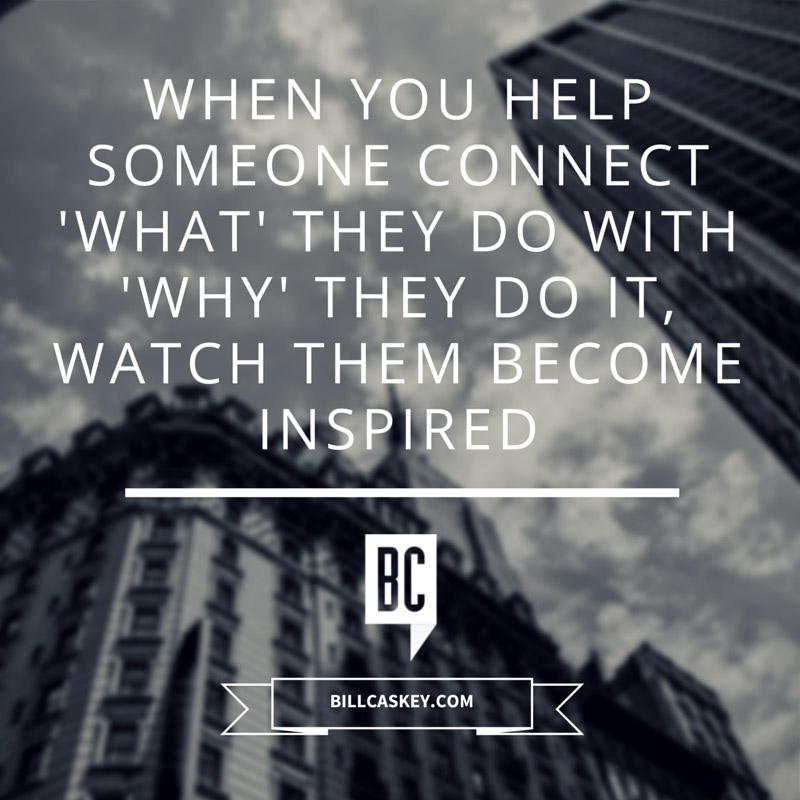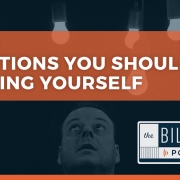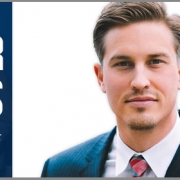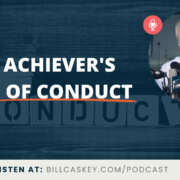Why Do You Do The Work You Do?
In my training and coaching practice, I have frequent occasions to question new clients as they’re on-boarded into my program.

A question that I always ask – and am never quite satisfied with the answer – is “Why do you do what you do?”
Usually, I get answers like:
- “I want to build my assets for ‘retirement.'”
- “My family is important and I want to provide for them.”
- “My father taught me to work hard so that’s what I do.”
- “I’m afraid to be unemployed.”
- “I needed a job and they needed a person.”
Sorry, not good answers.
Think through this with me. You put in 40-60 hours/week. That’s 2500-3000 hours/year. Doesn’t it make sense that the work itself is meaningful to you?
At a time when over 55% of our workers are only ‘slightly engaged’ or ‘not engaged’ with their work, it seems to be a useful exercise to link what the work really means to you. If you’re a leader of people, make sure you know exactly why your talent does this work.
Yes, you may have to probe, pry or prompt a little. But when you get there, you will watch a connection being made. And that connection serves to inspire that person to bringing a slightly better game to work each day. It’s what we call “working on purpose” and it will radically shift performance of your team.
[tweetthis]When you help someone connect ‘what’ they do with ‘why’ they do it, watch them become inspired.[/tweetthis]
Other questions that might jostle some things loose in your brain:
- What gives you the most satisfaction/pleasure in what you do?
- When do you lose track of time when you do what you do?
- What part of your job would you do even if there was no pay?
Those questions should be part of your library to help you connect your business role and your life’s work.
Your Stories
I want to hear stories from you as to how you became connected to what you do? What process did you go through? Who, among your mentors, helped you connect those dots?




When my four children were all in school and after 20 years of being a stay at home mother, I answered an ad for an office manager. I had taken a course in shorthand at the time (long time ago) and assumed that I would qualify for such a position. The owner interviewed me and quickly informed me that shorthand wouldn’t be a factor at all. This company published a weekly classified paper that was getting to be well known. It turned out that he hired me, and that was nearly 30 years ago. Things have certainly changed over the years but the confidence that the owner had for my ability gave me the confidence to feel worthy in a way that I had never felt before. With my new-found ego I became a salesperson/manager, then a corporate title, and finally publisher and general manager. Since then this company has been sold twice, and the changes in the media have certainly changed. I am still the publisher, sales manager, and very much what I started out to be. But what I remember the most and the best is the confidence the founder of this company instilled in me from the very first time I met him and throughout our years of working together. He enabled me to be confident in my instinctive ability and gave me the respect I needed to feel capable. He always told me, “Yes you can.”
I do this job because I love it and believe in it!
I have lived in my village from the time I was born. I grew up in this tiny village, facing numerous challenges. I have a history of missing meals, living a life full of uncertainties because you aren’t sure whether you would be in school the following day or not; you think of learning in a classroom with no walls and rusted iron sheets above your head and start imagining whether other children also go through the same. From school as you walk home down a flooded road, you see poor farmers counting their loses because heavy flooding has swept away their crops, the same floods that had destroyed part of our classroom.
From a very young age, I knew I had a responsibility to change the conditions my community were living under. Life could be so sweet in the village, but also very unbearable because of lack of knowledge. I knew I had to take a path that would change the shape of my community.
I got an opportunity to go through training in agriculture and forest science. I was so excited when I received my admission letter because I knew I would come back to change the way my community has been practicing farming so that they could start filling their baskets with food for consumption and surplus for income.
I landed my first job from college in 2006 with Kenyan Working for Environmental Restoration-KWER, a community based organisation in Kisumu. This is an organization that our community formed to address the perennial flood menace, environmental degradation, improve agricultural productivity and other crosscutting issues such as poverty and HIV/AIDS.
I was aware that to effectively solve the community’s challenges, there was need for bench marking with other communities facing similar challenges and this is how I found myself at OLPS. I found that OLPS’ mission of working with communities to find solutions to their challenges resonated so well with my mission and I was convinced that I would make a perfect team player for this organisation.
I was informed that I would be required to use my life experience to mentor children in school by demonstrating to them that their prevailing circumstances shouldn’t be a factor to define their destiny, but rather a clear focus into what they would wish to become when they grow up. I thought about my village experience and I knew this was a job I could perform with passion and for sure I did it!
After about four years, I requested to be allowed to put my knowledge and experience in environmental management and agriculture at OLPS’ Sustainable Farm. I was aware this was going to be a huge responsibility because this isn’t a very good area for agriculture, especially for crop production. However, my passion to use agriculture to create sustainable impact on the socioeconomic well being of the community informed my decision to take the responsibility.
Things have certainly changed over the years but the confidence that the organisation had for my ability gave me the confidence to feel worthy in a way that I had never felt before. Since then, I have seen the farm grow from nearly bareland to very productive land with multiple enterprises with a great promise for profitability and sustainable impact in the community’s livelihood and the organization’s revenue flow for its other programs such as the rescue center for children.